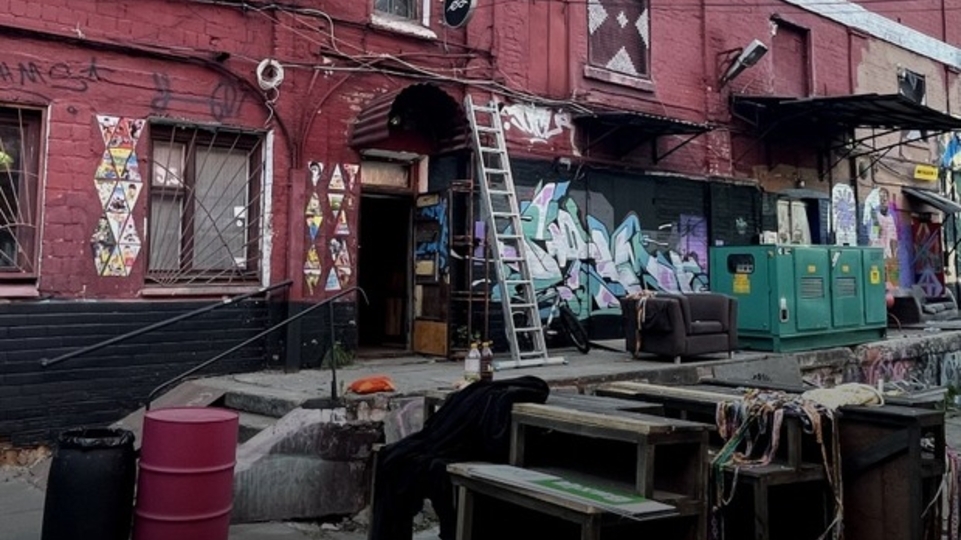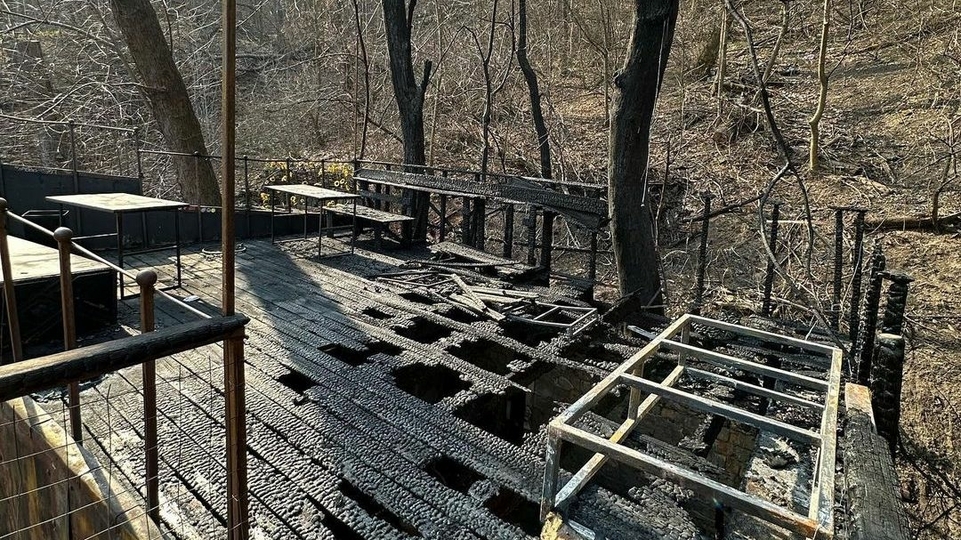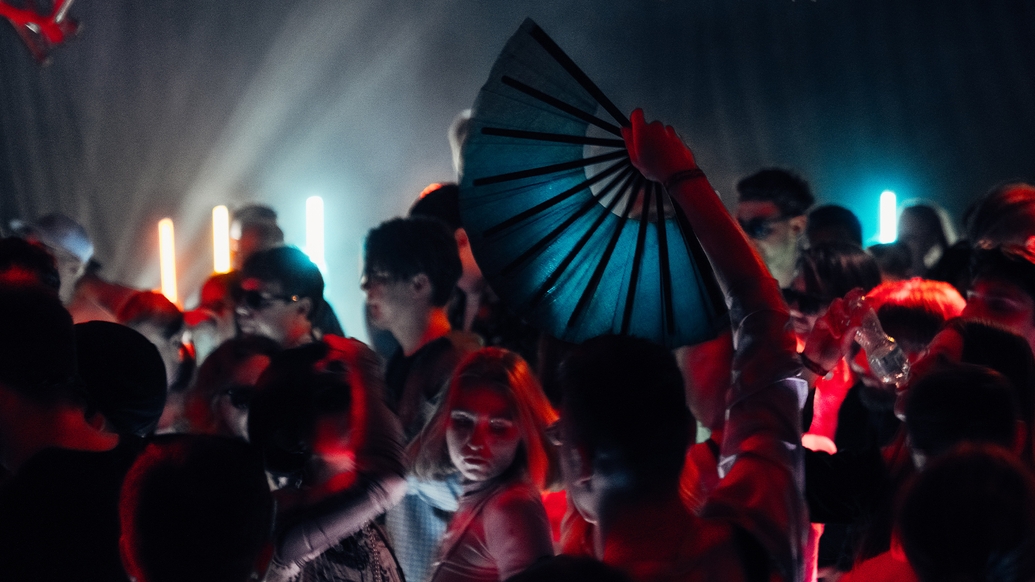
At Kyiv's Strichka Festival, ravers dance in defiance
In May, Strichka Festival took place at Kyiv's Closer club in defiance of the Russian bombardment that had intensified in recent weeks. Here, Kit Macdonald reports back from the event, and meets artists and punters determined to show that they won’t be bowed by Putin’s war machine
In the early hours of Saturday 20th May, Russia attacks Kyiv for the 10th night in a row. DJ Mag counts 10 window-rattling explosions in 10 minutes during one particularly intense period, as dozens of Iranian-made Shahed drones are shot out of the sky by the city’s air-defence batteries. Three nights previously, a cacophonous, terrifying missile dogfight played out above the city centre at 3AM, as multiple types of missile and drone were thrown at Kyiv simultaneously in a (thankfully) vain attempt to overwhelm the city’s air defences. By 20th May nobody in Ukraine’s capital has had a normal night’s sleep in a while.
Trying to exhaust Kyiv’s residents with endless attacks in the middle of the night is the Putin regime’s latest gambit in its psychotic campaign to break the city. Moscow’s previous ideas in this regard — strolling in and taking the city in three days; besieging it; depriving it of heat and light in the winter months — failed, and this latest tactic is doomed to fail too. Evidence for Kyiv’s unbreakable spirit under Russian attack has been everywhere since 24th February 2022, and yet more comes in the late morning of 20th May as Strichka Festival opens right on schedule at the legendary Closer club.
Closer was by no means the first great club in Kyiv, but it has elevated the city’s scene since it opened in 2013. Strichka (the word means ‘ribbon’ in Ukrainian) started the following year and quickly became an unmissable date for the diary, a supremely well-executed start-of-the-summer party that retained a ‘by locals for locals’ mission despite increasing international renown. The sprawling former factory space of Closer, only part of which is used on regular nights, opens up fully for Strichka, with a labyrinth of corridors and staircases linking four beautifully decorated indoor stages, bar areas, chillout zones and more. There are two outdoor stages on Saturday and three on Sunday, with wooden walkways leading to various vantage points and seating areas on the wooded hillside surrounding the club.

Instead of running non-stop from Saturday evening into Monday morning as previous editions have, Strichka 2023 has to work around a midnight-to-5AM wartime curfew, meaning two separate days of programming running from the morning until around 10.30PM. Employing typical Ukrainian understatement, Serhij Vel, one of Closer’s directors and co-owners, tells DJ Mag about the challenge of organising this particular Strichka. “It was a bit more difficult than usual. We don’t have the full team here just now, and for me the nightly shelling of Kyiv has made for a not-quite-stable mental state. Convincing foreign artists to come was also difficult, but we really appreciate the support of the ones who did.”
The handful of foreign artists who do make it are clearly enchanted by what they find. “As artists this has to be why we do it,” the American DJ/producer Adam Parker, AKA Afriqua, tells DJ Mag right after playing a rapturously received set on the Closer stage. “When they asked I was very quickly like, ‘I can’t imagine a situation in which I don’t do this’. This is the club at its most necessary, it means 10 times more in a situation like this.”
Thanks to the pandemic and then the full-scale invasion, this is the first edition of Strichka in its intended form since 2019, an online version and an in-person autumn edition having been staged in 2021. If there was no possibility of Strichka going ahead in 2022, then it seems there was no possibility of it not going ahead in 2023. “We understood early on that we had to do it,” Sasha Shults, a member of the Closer team who plays the festival’s second day, tells DJ Mag later. “A lot of military guys called us and said they wanted to come to Strichka for the one short holiday they’ll have in six months.”

“It feels like the festivals we had before took place in another life... The people are here not to forget about the war, but to remember how valuable life is and how beautiful it can be” – Natalia
One of the military men at the event — a young guy in a blue t-shirt nodding happily along as Trippsy plays airy techno on the packed Lesnoy Prichal stage on Sunday afternoon — is pointed out by a friend. It turns out that during the nearly year-long battle for the town of Bakhmut, he had been wounded, captured by the Russians and imprisoned in a basement in a nearby village. The village then became contested again and he was abandoned by his captors. He spent 42 days alone in the basement surrounded by dead comrades before Ukrainian troops liberated the village and discovered him. He had had no food and had lost almost half his body weight, and had to drink water from puddles and radiators to stay alive. If ever there was an example of the value of music, culture and togetherness then here he is, soaking up the vibe a few feet away.
Walking into Closer on Strichka’s opening morning, there is no hint of the nightly traumas the city is being subjected to — just the delightful sight of a well-run festival gearing up for the day. After exploring for a while and getting lost a couple of times, DJ Mag finds the Kyiv native Alisa Mullen, AKA Travis, playing in Otel’, Strichka’s dark techno lair. For Mullen, it’s a career milestone and emotional homecoming rolled into one — she worked as a PR for Closer for many years, but left Kyiv with her young son on the day of the full-scale invasion and has since carved out a new life and a burgeoning DJ career (she was profiled as an emerging artist in the May 2023 edition of DJ Mag) in Berlin.
“It was an unusual feeling to ‘work’ at the festival not as a PR but as a DJ,” she tells DJ Mag. “Closer would never put someone on the line-up just because they used to work at the club though, so it means they trust me and my skills.” Mullen says the gruelling overland journey required to get to Kyiv these days is what makes coming here difficult, rather than any danger involved.
“On the other hand,” she adds, “I can’t lie and say hearing the air defence working every night is a pleasure — it’s fucking terrifying. I understand the artists who don’t want to come, but if they do the people here will always remember that they supported them at such a difficult time. The road here is exhausting, but it’s really worth it.” Mullen’s pacy, bassy selections include many tracks by Ukrainian artists, including ‘Vilna Dusha’ by Bodro (feat. Rusiiik), which pivots on lyrics about the free Ukrainian soul.

Outside at the Dvir stage, the venue for most of the weekend’s live sets, the sun is shining and the place is beginning to fill up. Many people wear vyshyvankas — Ukrainian ethnic embroidered shirts — Vyshyvanka Day having fallen two days previously. Another popular fashion choice is a t-shirt reading ‘We will rave on Putin’s grave’. As two of the several dogs in attendance wrestle in front of the stage, the Swiss-Tunisian producer ISH is playing in his Kind Des Geistes guise, for which he uses a device that gives a live visualisation of his brainwaves.
The visualisation triggers synthesisers and turns the brainwaves into beautiful, abstract grooves, and is also fed through a video synthesiser to create visuals. “The appreciation I received after the gig was truly special,” the producer, real name Ismael Zouaoui, tells DJ Mag. “I had never encountered so many grateful people for my performance, and it was deeply moving for me.”
On Sunday the indoor stages are closed, leaving two large outdoor stages (Dvir and Lesnoy Prichal) open, plus the smaller Closer Connections stage. Greek DJ/producer John Dimas plays a standout set of sunny house and techno on Dvir on Sunday afternoon, and during it DJ Mag gets talking to two friends, Natalia Sniehur and Kateryna Prohnimak. “It feels like the festivals we had before took place in another life,” Natalia says. “The people are here not to forget about the war, but to remember how valuable life is and how beautiful it can be. We just hope we will win soon, and that soon we can have festivals in a peaceful Ukraine again.
Kateryna tells DJ Mag that part of the reason she’s here is to give her boyfriend a direct connection to the festival. “He is a great fan of Strichka and he used to visit it regularly before the full-scale war, but since last year he has been in the Armed Forces of Ukraine, fighting for our freedom and future.” He had encouraged Kateryna to attend and was in touch from a frontline area as she tried to share as much of the atmosphere as possible with him.

The end of both nights of Strichka bring powerful gestures of togetherness as the crowds sing the Ukrainian national anthem together. The most striking comes at the end of a brilliant live set from the singer Alina Pash. The police have arrived to ensure the festivities end at the appointed time, and Pash’s request to perform one more song has been denied. “OK, but you can’t forbid this song!” she shouts, and leads the crowd into a stirring rendition of the national hymn.
In the days since Strichka, Russia’s bombardment of Kyiv has intensified, but so has the defiance and determination of the city’s residents to simply live the lives Vladimir Putin and his henchmen want to deprive them of. At a time when some of the more idiotic denizens of the internet are pushing videos of ‘normal life’ going on in Kyiv (distance to the frontline: around 800km) as evidence that the West should withdraw support, Kateryna Prohnimak’s words resonate when DJ Mag contacts her again after the festival.
“An outside observer might be surprised by the ‘peaceful vibe’ of Strichka, but we gathered here to prove that life goes on and to show our brave defenders that they have a life and a ‘peaceful vibe’ to return to when all this is over. For me it’s to show that one day, when the war is over and when my boyfriend is back home safe and sound, we’ll rave together again.”
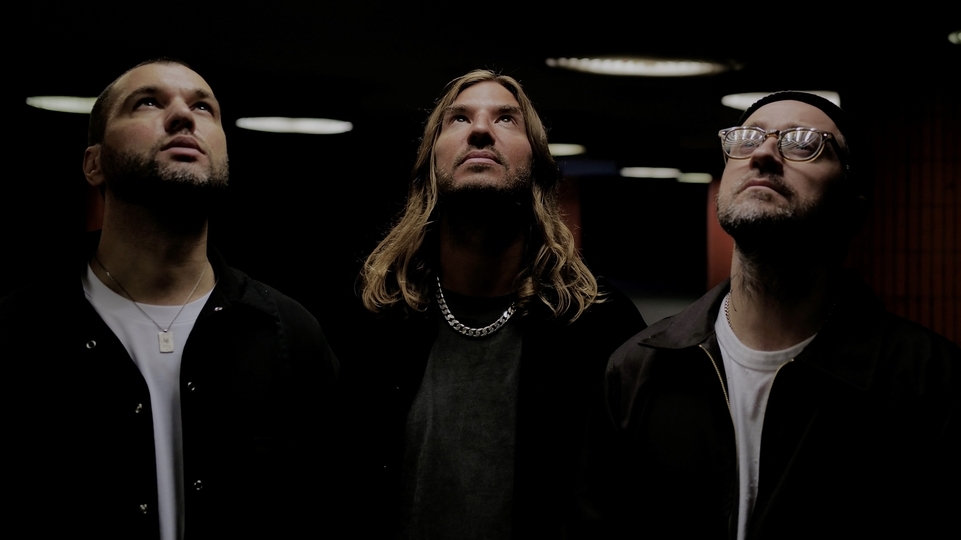
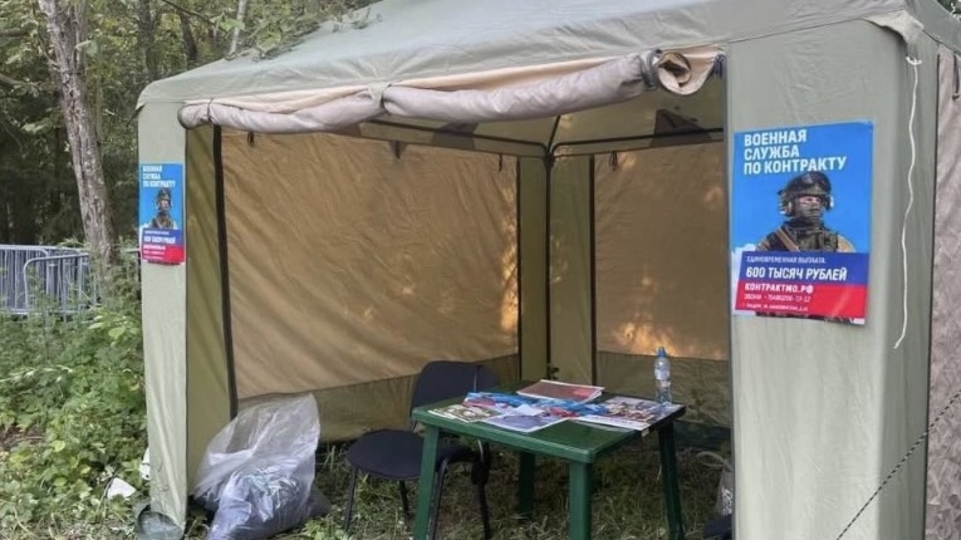
 (2).jpg?itok=vtMPIgMC)
